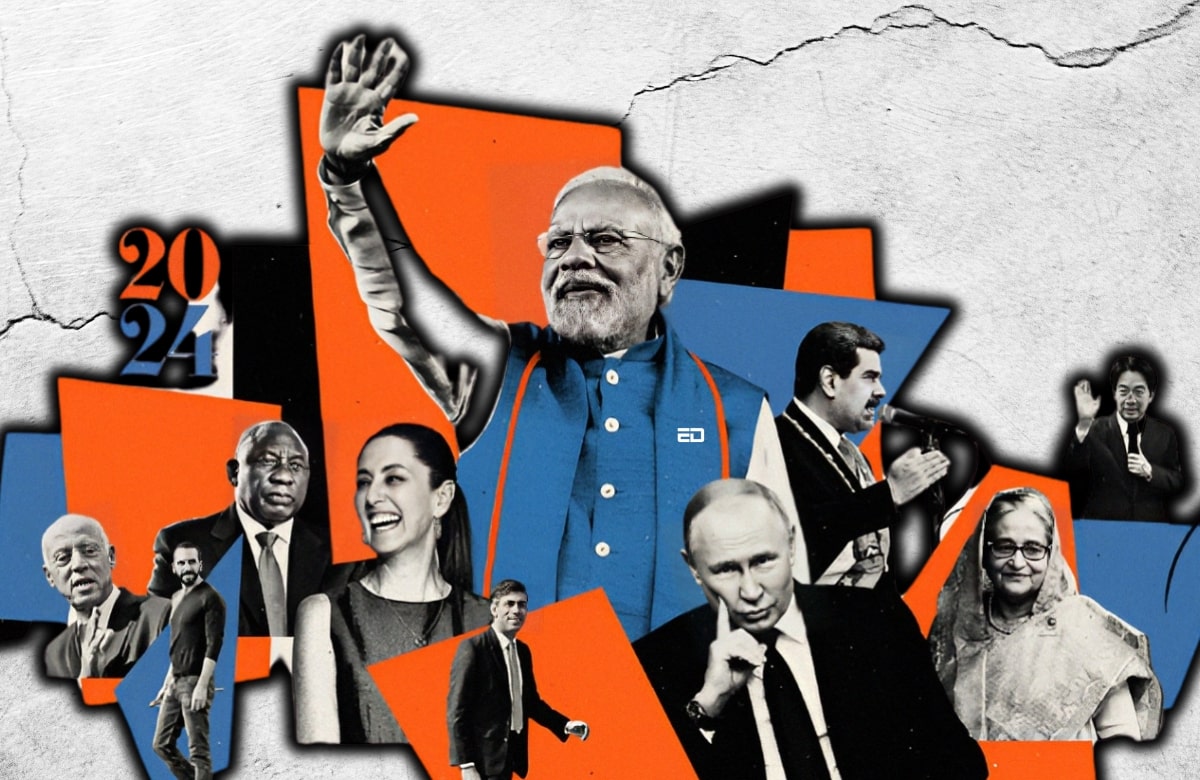An election-packed 2024 has the potential of swinging the world market as over 60 countries hold elections this year, with 4 billion people going to vote. These countries make up over 60% of the world’s economic output.
Markets face a ballot box bombshell and a precedent of this kind of event risk shows big changes can cause sell-offs.
Taiwan:
Elections in Taiwan are scheduled for January 13, 2024.
Its ruling Democratic Progressive Party (DDP) is competing mainly with the opposition Kuomintang (KMT) for the legislature and presidency. China calls the DPP a separatist and their win, which would be a third consecutive victory, could potentially fuel Beijing’s determination to control Taiwan. The KMT denies being pro-Beijing but favours closer ties with China.
China recognises no claims of sovereignty by Taiwan, which is the main flashpoint in US-China tensions. Investors have slashed China allocations as they fear sharpened trade tariffs.
A full-blown Chinese invasion of Taiwan, although seen as unlikely in 2024, would be a potentially catastrophic risk to global markets potentially halting advanced chip-making and wiping $1 trillion off annual global economic output.
Also Read: Maldives Travel Body Urges Indian Counterparts To Lift Ban On The Country’s Tourism
Europe:
European countries like Portugal will hold elections on March 10, Belgium on June 9, among others, while the European Parliament elections are set to hold from June 6-9.
The shock win for Geert Wilder’s Freedom Party in November 2023, in the Netherlands galvanized the Eurosceptic far-right. Its namesake is leading Austria’s polls.
Far-right parties eye gains in the European Union legislature, vowing to toughen migration policy and soften green reforms.
Europe’s top 2023 performers, the Italian stocks and bonds may suffer if gains for eurosceptic parties are seen as weakening the commitment to European legislature.
The perceived riskiness of Italian debt was reduced with the EU raising joint debt to back the post-pandemic recovery.
Russia:
The elections in Russia are set to take place on March 17, 2024.
Vladimir Putin was handed the presidency by Boris Yeltsin on the last day of 1999. With approval ratings of above 80% in Russia, he is certain to win another six years in power. According to the Opposition, the election is a carefully stage-managed imitation of democracy.
Western governments like the United States and Japan are planning on seizing frozen Russian assets such as cash and government bonds held by its central banks overseas.
Russia said that it will retaliate if this happens and Putin has also warned the West any attempts to meddle in the election will be considered an act of aggression.
India:
The elections in India are set to take place between April and May of this year.
Leading the Hindu nationalist Bharatiya Janata Party (BJP), Narendra Modi is expected to win a third term as Prime Minister.
India, a key commodity exporter, has roiled markets by restricting rice, wheat and sugar exports. Funding from potentially record-high domestic market borrowing would be required if India’s fiscal deficit rises with a shift back to fiscal populism.
Mexico:
June 2 is the scheduled date for elections in Mexico.
The presidential election involves a full Congress reshuffle and nine state elections. Polls give the incumbent National Regeneration Movement (Morena) party and its candidate, Claudia Sheinbaum, a wide double-digit lead.
Given the success of current President Andres Manuel Lopez Obrador’s spending drives, Sheinbaum is expected to follow suit. However, heftier spending could pull down Mexico’s peso and hurt government bonds.
South Africa:
The elections here are between May and August.
The ruling African National Congress risks losing the parliamentary majority for the first time since Nelson Mandela led to power in 1994. Voters have been alienated because of economic turmoil, austerity, power cuts, and graft allegations. The situation is such that the ANC might need to partner with the Democratic Alliance or the Marxist Economic Freedom.
Before the elections, the government can reduce austerity, pushing up debt. Social spending could rise if the ANC allies with a leftist party. Rate cuts can slow down because of worries about a weak currency and public finances.
United States:
The elections in the US are scheduled for November 5.
Predictions say that Donald Trump may win the Republican nomination in primaries in the upcoming months, leading to a tight battle with Democrat incumbent, Joe Biden. The 2020 election ended with a pro-Trump mob storming Congress in an attempt to block certification of Biden’s victory, causing the market to shrug off.
A Trump-Biden rematch this time could worry the investors over the risk of social unrest. An acidic election could affect consumer sentiment as the biggest economy of the world seeks to avert a recession from the lagged effects of aggressive interest rate rise.
Stocks could be injured due to US-China tensions if the parties harness the popularity of trade barriers, while higher tariffs would fuel inflation, and force up the dollar, hurting the Yuan, Euro and Mexican peso.
In case either party pledges spending cuts, a complex US bonds trade could be upended. Spending cut pledges by either party might upend a complex but popular US bonds trade that wagers government borrowing will increase. Moreover, Trump favours more US drilling, which Biden has reined in.
Image Credits: Google Images
Sources: Reuters, Moneycontrol, Business Today
Find the blogger: Unusha Ahmad
This post is tagged under: elections, 2024, China, India, US, Taiwan, Mexico, market, DDP, KMT, Beijing, tariffs, Europe, European Parliament, Italy, policy, Russia, Putin, Japan, Morena, Modi, BJP, South Africa, Nelson Mandela, ANC, Trump, Biden
Disclaimer: We do not hold any right, copyright over any of the images used, these have been taken from Google. In case of credits or removal, the owner may kindly mail us.
Other Recommendations:
Criteria Bars Rahul Gandhi, Priyanka Gandhi From Getting Invited For Ram Mandir Inauguration






























